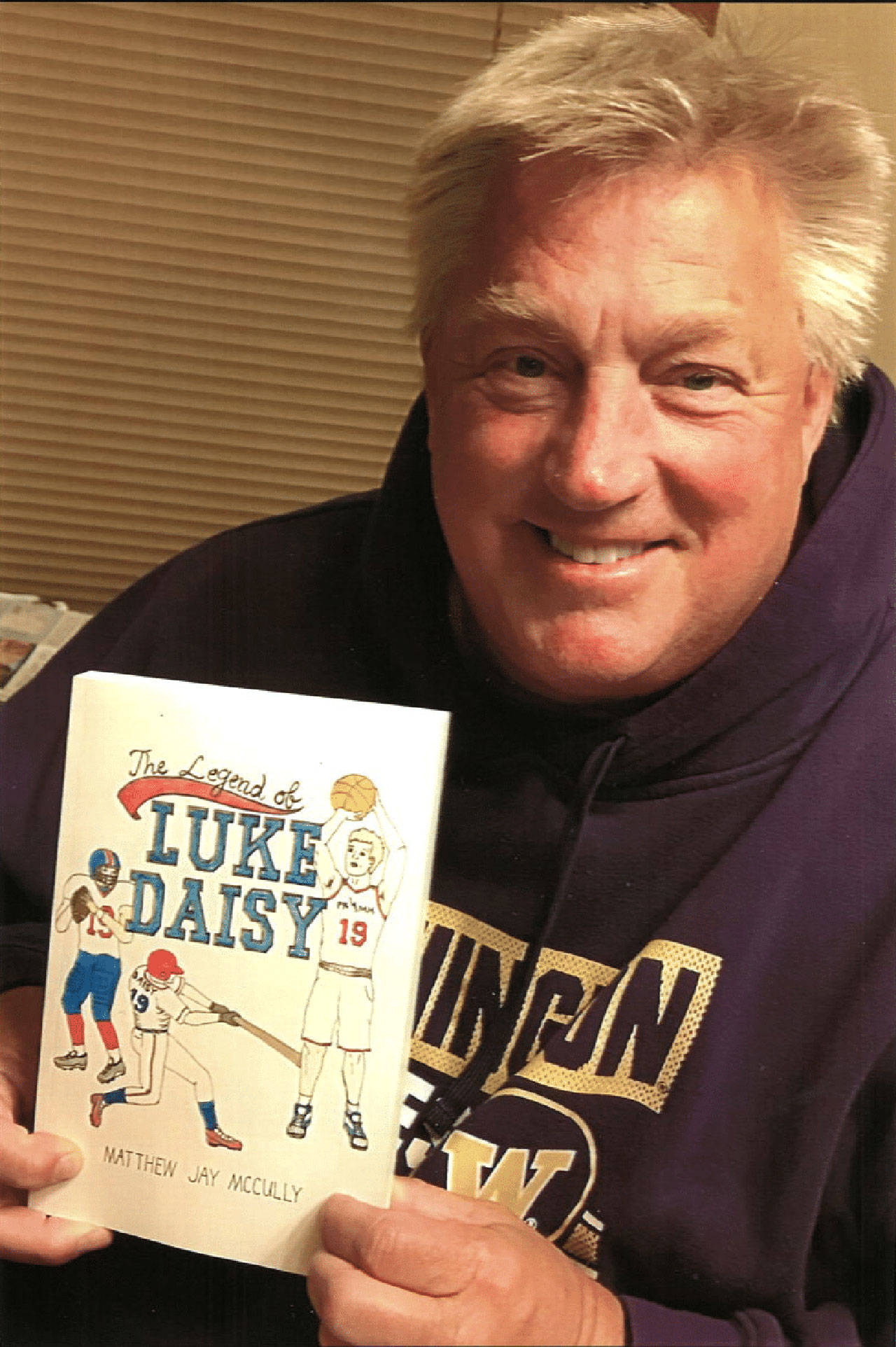From friendship to sports and the pursuit of happiness, Enumclaw author Matthew McCully’s 2019 book “The Legend of Luke Daisy” is a window into a kid’s life in the 20th century.
The 280-page story, which McCully says he started writing as a Young Adult Christian fiction novel, chronicles the life and friendships of Luke Daisy, whose exceptional athletic abilities propel him and his Pacific Northwest friends through epic sporting competitions and nerve-wracking encounters with girls during the second half of the last century.
Luke and most of the cast live in Bonney Flats, a fictional city roughly analogous to Federal Way, and they grow up buying 40-cent hamburgers and singing along with The Beach Boys. Their lives and adventures are fictional, but based on McCully’s own memories growing up.
“I had the story in my head forever,” McCully, 65, said. “They say write what you know. Well, the time frame, the location, the whole idea of sports, which was a big part of my life, the group of friends, it’s sort of the way we grew up.”
McCully graduated from Thomas Jefferson High School in Federal Way and majored in journalism at the University of Puget Sound (UPS) in Tacoma. He spent three years at the Wenatchee World as a sportswriter, and four as a sports information director at UPS, prior to his 29-year career in air traffic control.
Now retired, McCully spends his days enjoying pickleball, golf and spending time with his grandkids. He spent about seven months writing “Luke Daisy” across 2018 and 2019.
Those who also grew up in or around “Bonney Flats” might recognize a few characters whose names are taken from real-life people McCully admires. That includes Gary Radliff, one of Luke’s little league heroes; the real Radliff is, of course, a retired hall of fame Enumclaw basketball coach.
“Luke Daisy” is grounded in the regular thrills and challenges of young adulthood, but a faint undercurrent of fantasy elevates the schoolyard and gridiron drama. Told from the perspective of Michael, one of Luke’s young friends, it’s as if McCully clicked the halcyon lens of childhood onto a story which had grown and become exaggerated in the narrator’s telling.
“Forrest Gump” and “The Sandlot” are two of McCully’s favorite movies, and thematically, their inspiration is clear in the whimsical camaraderie and storytelling style of “Luke Daisy.” Sneering bullies named “Bruce Junkers” and “Marv Snortberry” sling insults at Luke, his mentally disabled brother and their friends, and diabolical coaches like “Hugh Jeego” scheme to keep Luke from achieving greater athletic heights.
With a few exceptions, Luke and his friends usually outsmart them.
While the story focuses on Luke and his friends’ adventures and setbacks, McCully also blends their lives with real-life vignettes from the 20th century. The characters, born in the 1950s, witness the deaths of Buddy Holly, Ritchie Valens and J.P. Richardson, the assassination of Martin Luther King, Jr., the moon landing, and a whole host of astounding moments in sports history.
And the book touches on weighty social issues, too, such as when one of Luke’s friends, who is black, asks his family and friends what it means to be “proud” of being black.
“I wanted to portray the way I was raised: That it doesn’t make any difference whether you’re white or black,” McCully said. “These guys are friends not because of, or in spite of, the color of their skin. They’re just friends. They like the same stuff. They do the same stuff.”
In writing the story, McCully grew to love his characters – “They become real to you,” he said. He recalled a conversation with his wife in which, with tears in his eyes, he told her that he’d just written the death of a certain character in the book.
“She goes, ‘You can’t be mad! You’re the one who killed him,’ ” McCully said. “Well, I know, but in writing it, it still made me sad.”
Baby Boomers and those with an interest in the 1960s and ‘70s might enjoy the cultural tapestry McCully weaves of that time, while those of faith may take inspiration from the book’s moral basis in the Bible. Anyone looking for a wholesome coming-of-age story could find meaning in the book’s explorations of community, mortality, sportsmanship and love.
McCully said he doesn’t have another book in mind yet – but he also doesn’t count out the possibility that inspiration could strike again.
Because McCully wasn’t particularly obsessed with cashing in or reaching a bestseller list, he opted to self-publish. Much of the book’s sales have been through Amazon, which has allowed him to sell the books without much financial risk.
Overall, “Luke Daisy” has sold about 300 copies, a number McCully is happy with.
“At the end of the month, if I sold three books, I get a check for $12.42,” McCully said with a laugh. “It pays for half a round of golf.”


